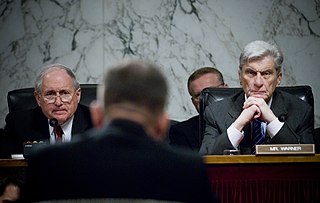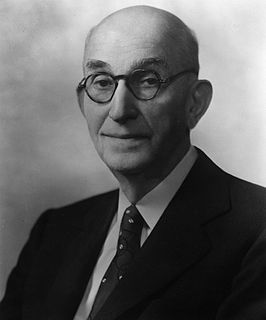Related Research Articles

The Reclamation Act of 1902 is a United States federal law that funded irrigation projects for the arid lands of 20 states in the American West.

A congressional committee is a legislative sub-organization in the United States Congress that handles a specific duty. Committee membership enables members to develop specialized knowledge of the matters under their jurisdiction. As "little legislatures", the committees monitor ongoing governmental operations, identify issues suitable for legislative review, gather and evaluate information, and recommend courses of action to their parent body. Woodrow Wilson once wrote, "it is not far from the truth to say that Congress in session is Congress on public exhibition, whilst Congress in its committee rooms is Congress at work." It is not expected that a member of Congress be an expert on all matters and subject areas that come before Congress. Congressional committees provide valuable informational services to Congress by investigating and reporting about specialized subjects.

Carl Trumbull Hayden was an American politician. Representing Arizona in the United States Senate from 1927 to 1969, he was the first U.S. Senator to serve seven terms. Serving as the state's first Representative for eight terms before entering the Senate, Hayden set the record as the longest-serving member of the United States Congress more than a decade before his retirement from politics. He was Dean of the United States Senate and served as its president pro tempore and chairman of both its Rules and Administration and Appropriations committees. He was a member of the Democratic Party.
The Federal Power Act is a law appearing in Chapter 12 of Title 16 of the United States Code, entitled "Federal Regulation and Development of Power". Enacted as the Federal Water Power Act on June 10, 1920, and amended many times since, its original purpose was to more effectively coordinate the development of hydroelectric projects in the United States. Representative John J. Esch (R-Wisconsin) was the sponsor.

The 66th United States Congress was a meeting of the legislative branch of the United States federal government, comprising the United States Senate and the United States House of Representatives. It met in Washington, DC from March 4, 1919, to March 4, 1921, during the last two years of Woodrow Wilson's presidency. The apportionment of seats in the House of Representatives was based on the Thirteenth Census of the United States in 1910.

The 38th United States Congress was a meeting of the legislative branch of the United States federal government, consisting of the United States Senate and the United States House of Representatives. It met in Washington, D.C. from March 4, 1863, to March 4, 1865, during the last two years of the first administration of U.S. President Abraham Lincoln. The apportionment of seats in the House of Representatives was based on the Eighth Census of the United States in 1860. The Senate had a Republican majority, and the House of Representatives had a Republican plurality.
Congressional oversight is oversight by the United States Congress over the Executive Branch, including the numerous U.S. federal agencies. Congressional oversight includes the review, monitoring, and supervision of federal agencies, programs, activities, and policy implementation. Congress exercises this power largely through its congressional committee system. Oversight also occurs in a wide variety of congressional activities and contexts. These include authorization, appropriations, investigative, and legislative hearings by standing committees; which is specialized investigations by select committees; and reviews and studies by congressional support agencies and staff.

The U.S. House Committee on Natural Resources or Natural Resources Committee is a Congressional committee of the United States House of Representatives. Originally called the Committee on Interior and Insular Affairs (1951), the name was changed to the Committee on Natural Resources in 1991. The name was shortened to the Committee on Resources in 1995 by the new Chairman, Don Young. Following the Democratic takeover of the House of Representatives in 2006, the name of the committee was changed back to its title used between 1991 and 1995.
The Weeks Act is a federal law enacted by the United States Congress on March 1, 1911. Introduced by Massachusetts Congressman John W. Weeks and signed into law by President William Howard Taft, the law authorized the US Secretary of Agriculture to "Examine, locate and recommend for purchase ... such lands within the watersheds of navigable streams as ... may be necessary to the regulation of flow of navigable streams...." This meant that the federal government would be able to purchase private land if the purchase was deemed necessary to protect rivers' and watersheds' headwaters in the eastern United States. Furthermore, the law allowed for land acquired through this act to be preserved and maintained as national forest territory. Six years earlier, the Transfer Act of 1905 transferred control over the federal forest reserves from the General Land Office of the Department of the Interior to the Department of Agriculture and its Forest Service. Responsibility for land purchased through the Weeks Act was not given to former Chief Forester Gifford Pinchot because he resigned from the National Forest Reservation Commission in 1907, with the stipulation that he would only resign if he could appoint his successor. This stipulation led to the Forest Service's tradition of picking a head with forestry knowledge. With the land acquired through the Weeks Act, Pinchot's successor obtained the power to issue permits for water power development on National Forests. The Weeks Act appropriated $9 million to purchase 6 million acres (24,000 km2) of land in the eastern United States.

Wayne Norviel Aspinall was an American lawyer and politician from Colorado. He is largely known for his tenure in the United States House of Representatives, serving as a Democrat from 1949–1973 from Colorado's Fourth District. Aspinall became known for his direction of the House Interior and Insular Affairs Committee, of which he was the chairman from 1959–1973. Aspinall focused the majority of his efforts on western land and water issues.
Navigable servitude is a doctrine in United States constitutional law that gives the federal government the right to regulate navigable waterways as an extension of the Commerce Clause in Article I, Section 8 of the constitution. It is also sometimes called federal navigational servitude.
The Legislative Reorganization Act of 1946 was the most comprehensive reorganization of the United States Congress in history to that date.

Mark Eugene Amodei is an American lawyer and politician serving as the U.S. representative for Nevada's 2nd congressional district since 2011. The only Republican in Nevada's congressional delegation, he served in the Nevada Assembly from 1997 to 1999 and in the Nevada Senate, representing the Capital District, from 1999 to 2011. Amodei chaired the Nevada Republican Party from 2010 until 2011, when he stepped down in order to pursue the nomination for a special election for Congress; he was the Republican nominee in the election held on September 13, 2011, to replace Dean Heller, who had been appointed to the United States Senate. He became the dean of Nevada's congressional delegation once Heller lost his election for a second full term in 2019, although Dina Titus served one term in the House before he was first elected.
The United States House Committee on Territories was a committee of the United States House of Representatives from 1825 to 1946. Its jurisdiction was reporting on a variety of topics related to the territories, including legislation concerning them, and their admission as new states.
Solid Waste Agency of Northern Cook County (SWANCC) v. U.S. Army Corps of Engineers, 531 U.S. 159 (2001), was a decision by the US Supreme Court that interpreted a provision of the Clean Water Act. Section 404 of the Act requires permits for the discharge of dredged or fill materials into "navigable waters," which is defined by the Act as "waters of the United States." That provision was the basis for the federal wetlands-permitting program.

The Inland Waterways Commission was created by Congress in March 1907, at the request of President Theodore Roosevelt, to investigate the transportation crisis that recently had affected nation's ability to move its produce and industrial production efficiently. The immediate crisis centered on insufficient railroad capacity developed by the private sector, and competing but neglected inland shipping, the navigation of which had been deemed under federal purview since 1824. The temporary commission lasted until the end of Roosevelt's presidency, but his conservationist progressive interest was focused more than on transportation alone. The president wanted water projects to be considered for their multiple uses and in relation to other natural resources and asked for a comprehensive plan for the improvement and control of the river systems of the United States.

The Central Oregon Jobs and Water Security Act is a land-use and water bill related to the Crooked River in Oregon and the Bowman Dam. H.R. 2640 would modify features of the Crooked River Project located in central Oregon, north of the city of Prineville, and prioritize how water from the project would be allocated for different uses. It was introduced into the United States House of Representatives during the 113th United States Congress.

The Water Rights Protection Act is a bill that would prevent federal agencies from requiring certain entities to relinquish their water rights to the United States in order to use public lands.

The Pittman Underground Water Act was an Act of Congress, that was approved on October 22, 1919 and was repealed on August 11, 1964. The public law gave the Secretary of the Interior the power to hand out permits to American citizens and associations to drill for and look for groundwater on public lands in Nevada. In addition, the law gave the Secretary the power to give patents to permittees who found enough groundwater to sustain a farm. The law was supposed to stimulate agriculture in Nevada by supporting the development of artesian waters, since it was thought that the absence of surface water undermined the growth of the agricultural sector in Nevada.
References
- Schamel, Charles E.; Mary Rephlo; Rodney Ross; David Kepley; Robert W. Coren; James Gregory Bradsher (1989). "Guide to the Records of the United States House of Representatives at the National Archives, 1789-1989: Bicentennial Edition". National Archives and Records Administration. pp. Chapter 22. Retrieved 2009-02-13.